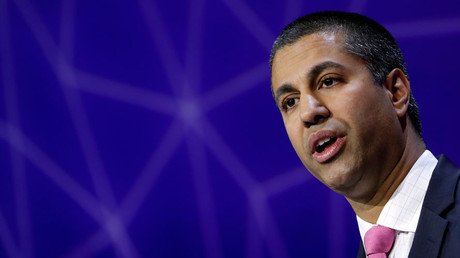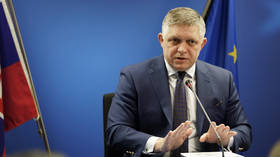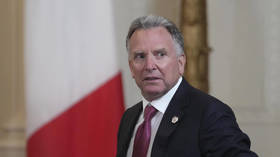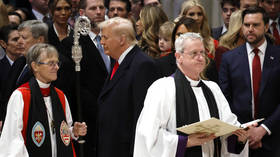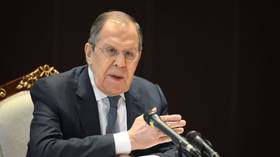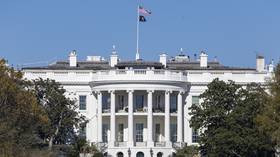FCC to reverse net neutrality, rejects ‘hysterical prophecies of doom’
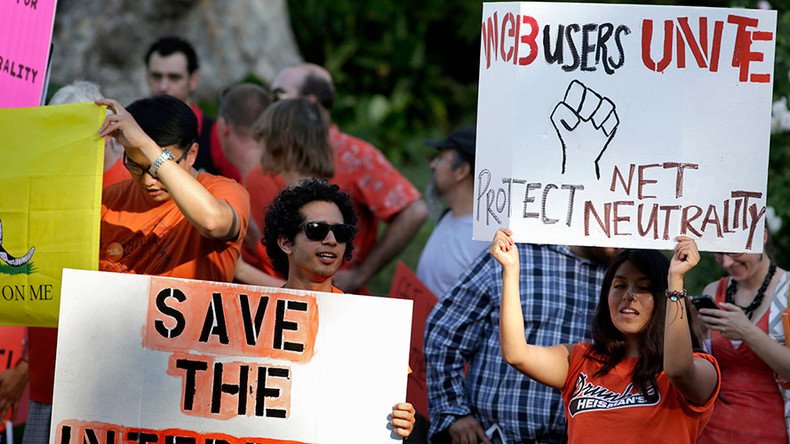
The FCC has announced that it will vote to overturn net-neutrality rules that require internet providers to treat all web traffic equally. If passed, ISPs could give or sell access to “fast lanes” and block traffic for others.
Federal Communication Commission (FCC) Chairman Ajit Pai announced Wednesday that he will next month start the process of reversing net neutrality rules put in place under former President Barack Obama.
Pai, who was named chair of the FCC by President Donald Trump in January, cited internet service providers (ISP) like AT&T, Comcast, and Verizon, which claim they have been burdened by the rules. According to Pai, the rules “slowed, if not halted, the development and deployment of innovative new offerings” that would benefit their customers.
According to the FCC website, net neutrality rules, which came into effect on June 12, 2015, were created in order to “protect and maintain open, uninhibited access to legal online content without broadband Internet access providers being allowed to block, impair, or establish fast/slow lanes to lawful content.”
However, Pai has laid out his argument to reverse the regulations. “Nothing about the Internet was broken in 2015,” he said at the Newseum in Washington during an event co-hosted by FreedomWorks, a limited government advocacy group.
“Indeed, the free and open Internet developed and flourished under light-touch regulation. We were not living in some digital dystopia before the partisan imposition of a massive plan hatched in Washington saved all of us,” Pai said.
The chairman said he will seek a commission vote on the proposal at the FCC’s next meeting on May 18.
Adopted by the FCC under its former chairman Thomas Wheeler, net neutrality regulations reclassified internet service providers (ISP) as “common carriers” under Title II of the Communications Act of 1934.
Title II was created in the 1930s to regulate the Ma Bell telephone monopoly. By applying these rules to ISPs, the FCC was given the authority to regulate the behavior of ISPs similar to utilities, subjecting them to more government oversight.
Under the rules, ISPs were banned from blocking or degrading access to any legal content, applications, services, or non-harmful devices. They were also banned from giving or selling access to “fast lanes” where traffic could be prioritized.
READ MORE: US internet providers pledge to not sell customer data after controversial rule change
Sir Tim Berners-Lee – credited with creating the world-wide web – released a statement Wednesday, calling for opponents to “fight for strong net neutrality protections to ensure that all internet traffic is treated equally, and the web remains an innovative, creative space for everyone.”
“When I invented the web, I didn’t have to ask anyone for permission, and neither did America’s successful internet entrepreneurs when they started their businesses,” Berners-Lee said. “The FCC’s announcements today suggest they want to step back and allow concentrated market players to pick winners and losers online.”
However, Pai thinks that the rules are protecting against “hypothetical harms” and “hysterical prophecies of doom,” according to his Wednesday statement.
“Did these fast lanes and slow lanes exist? No,” Pai said. “It’s almost as if the special interests pushing Title II weren’t trying to solve a real problem but instead looking for an excuse to achieve their longstanding goal of forcing the Internet under the federal government’s control.”
Pai argues that overturning the rules will create jobs, boost competition, bring high-speed internet access to more Americans and protect online privacy.
Others on the right agree the FCC rules were unnecessary and government oversight would only impede innovation.
President Obama’s #netneutrality scheme threatens Internet innovation. Today Chairman Pai took first step to remove the regulatory threat.
— Mike Lee (@SenMikeLee) April 26, 2017
Chairman @AjitPaiFCC’s proposed repeal of Title II will create jobs.
— The FCC (@FCC) April 26, 2017
#FCC Chair @AjitPaiFCC : small, competitive ISPs don't have the resources to expand/compete under today's Title II framework. #NetNeutrality
— Jonathan Lee (@telecomsense) April 26, 2017
Left-leaning advocacy groups and Democrats fear that if ISPs are left unchecked, they will abuse their power as gatekeepers of the internet. Many lawmakers on the left are promising to fight the FCC and protect the Obama-era regulations.
.@AjitPaiFCC, Trump should expect a tsunami of resistance from a grassroots movement of Americans 100% committed to defending #NetNeutrality
— Ed Markey (@SenMarkey) April 26, 2017
#NetNeutrality is NOT negotiable! Either @AjitPaiFCC back down, or grassroots activists will put unprecedented pressure on him to resign.
— The Humanist Report (@HumanistReport) April 26, 2017
Getting rid of #NetNeutrality = Trump’s corporate takeover of the Internet. Shame on him for trying to take away the free & open internet. https://t.co/M9xThU7HwY
— Tom Perez (@TomPerez) April 26, 2017
.@FCC@AjitPaiFCC For as long as the internet has existed, it’s been grounded on the principle of #NetNeutrality. https://t.co/FSBEd5jPH4
— Sen. Al Franken (@SenFranken) April 26, 2017
It’s almost as if the Trump Administration was determined to stack the deck against consumers… #NetNeutralityhttps://t.co/Ix15u3ItBC
— Nancy Pelosi (@NancyPelosi) April 26, 2017
This has allowed the internet to be a platform for speech, commerce & education. For the little guy, not just big corporations.
— Ron Wyden (@RonWyden) April 26, 2017
Republicans voted away your online privacy, now Trump’s FCC wants to take away your ability to use the internet how you want. #netneutrality
— Senator Brian Schatz (@SenBrianSchatz) April 26, 2017
.@realDonaldTrump@AjitPaiFCC Republicans first end broadband privacy protections and now want Internet toll lanes. Speak up and join me in fighting for #NetNeutrality
— Tom Udall (@SenatorTomUdall) April 26, 2017
